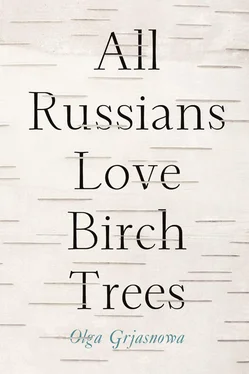“It’s not your fault.”
Mother raised her eyebrows.
“It’s me. Everyone around me dies.”
“That’s nonsense.”
“It’s not.”
“Yes, it is.”
“I had an abortion.”
“When?”
“When I was together with Sami. Shortly before I left him. I didn’t get my period and my first thought was that I’ll have to make an appointment and somehow find the time for an abortion between my exams. Then I did a test and it was positive.”
“I had no idea.”
“It didn’t even occur to me to keep the child. I was embarrassed about that. In the clinic the hallways were decorated with pictures of kids. Pink babies everywhere. Can you imagine that?”
“Did anyone go with you?”
“Cem. Everyone thought he was the father and was afraid of the responsibility. He didn’t deny it.”
“Where was Sami?”
“In the States. I never told him.”
“You look horrible,” Cem said.
In those last weeks I hardly left my apartment. I watched TV and occasionally flipped through books, magazines, or the phone book. My cellphone remained off and I didn’t check the mail anymore. I had not gone to work and had forgotten to request an extension of my scholarship. My mother paid for our — now my — rent. I knew things would have to change soon.
“I slipped,” I answered guiltily.
“Can’t you pay more attention?”
“My mother said the same thing.”
“Gee, Masha. You look like an abused wife. Seriously, pay attention. Otherwise I won’t go outside with you anymore.”
“Are you afraid?”
“Do you want me to get deported?” Cem went into the kitchen and poked his head into the fridge. He dug through the drawers, examining the vegetables, throwing away some and checking the expiration dates on the yogurts.
“You went shopping. Very good.”
“That was my mother.”
“Good woman.”
“And I’m not a good woman?”
“No.”
“No?”
Cem paced the living room, looking around. He tried to estimate how much of Elisha’s stuff was still there.
“No.” He shook his head decidedly. “You know, when a Turkish guy and a girl meet for the first time, and the girl — of course, Turkish as well — offers him cake or something else, the guy takes a taste. And then he decides whether she’s a good woman or not. If not he can at least cast her out before it’s too late.” Cem looked me directly in the eye. “Masha, not even the slightest chuckle?”
“Cem?”
“What is it?”
“Will you tell me how your brother died?”
“No.” He looked determined as he sat down next to me and pulled Zigzags and a small round can from his jacket pocket.
“Afghan Black, with very best wishes from Konstantin.” Cem let me smell the hash.
“Did he get it in the park?” I asked.
“From his cousin.”
“I was in the park the other day with—” I interrupted myself. Cem’s face hardened. I took a deep breath and continued. “I guess it’s been a while. Anyway, there were only thirteen-year-olds trying to sell me rosemary. I thought the kids belonged to the same group of guys I bought from in the past and told them in Turkish that they should do their homework instead of trying to fuck with hardworking people. One of them said that he only spoke German and the other called me white trash.”
Cem laughed at me.
“So Konstantin’s cousin doesn’t sell there anymore?”
“No, he works from home now. He just enrolled in economics.”
I took several deep tokes and passed the joint to Cem.
“Masha, I spent three hours in the booth today, interpreting French parliamentary speeches. If I don’t start studying at night, too, I’ll never pass that exam.”
Cem was my co-interpreter. We took turns, thirty minutes at a time, and together interpreted conferences in soundproof booths. We were well attuned to each other, immediately noticing if the other struggled with a word or an expression, sometimes helping or taking over early. Even our voices complimented each other nicely.
“Do you know the French term for synced election cycles ?” Cem asked.
I reached out for the joint again and again. My limbs grew heavy. Cem always got silly on drugs: “Continuous campaigning, federal budget, referendum, diéte fédérale allemande, mandats directs et mandats de listes .” He giggled.
From then on I went back to spending my mornings in the interpretation booth, where I listened to absurd speeches on renewable energy, income tax, and fish farming over my headphones and repeated the words into the microphone in German, Russian, or French. Even though I was concentrating, half an hour later I had forgotten what the speaker had talked about. I spoke without forming a single thought. My brain was a machine. The afternoons I spent in the library, sitting at a long table between dozens of other students and studying vocabulary. In the evenings I read scientific papers and articles. In the morning before classes I read newspapers and magazines in English, German, French, and Russian. I tried to fill the void with vocabulary.
On New Year’s Day Sami came by, unannounced. His hair was shortly cropped, about as short as his beard. He was wearing a parka, beat-up jeans tucked into heavy boots, and a neatly ironed bright blue shirt.
He followed me into the living room and sat down on the couch. He opened the bottle of wine that he had brought and we watched a movie on TV.
Sami had been born in Beirut during its civil war. Albert, Sami’s father, was Swiss, the son of Italians who later became French. He was the manager of a bank in Beirut. Shortly after Sami’s birth they were relocated to Paris and French became Sami’s real mother tongue. When he was thirteen, the family moved to Frankfurt. When he spoke Arabic, he always had to rely on French words to fill in the gaps. Beirut he only knew from short trips, images in the papers, and his mother’s long phone calls with Lebanese relatives that always ended in her crying.
Sami had an older brother, Paul, from his father’s first marriage. Albert’s second wife, Sami’s mother, treated Paul and Sami the same. Her favorite child was her youngest, born after their arrival in Frankfurt, whom she had named Leyla. Neither Sami nor Paul were jealous of Leyla. They both loved her sincerely and boundlessly. When Paul graduated from high school, Albert decided that it would be better for Paul to study economics in the United States. So Paul went to California. Sami had spent every summer with his older brother and soon moved in with him in the States in order to get his high school degree there. In his new school none of his classmates could figure out why he had both a hard German accent and an Arabic name. He was supposed to return to Germany, but didn’t because he fell in love.
A few weeks after arriving in the States, Sami met Neda. She was fourteen, had long, black hair, almond-shaped eyes, slender ankles, and, to Sami, she was unreachable. They became friends and sometimes went to dinner or to the movies, but Sami wasn’t even allowed to hold her hand. Neda fell in love with Paul, who didn’t much care for her, and besides, he would never have betrayed Sami. Sami and Neda remained friends. Sami finished high school and went off to college in a different city in California.
Two years passed and on one warm spring day when the campus was fragrant with lilac they happened to see each other again. Neda wore her hair down and — inevitably — a romance ensued. Except that Neda was from a traditional family. Her parents expected her to marry the older Persian doctor who had been chosen for her. Sami supposedly had a lot of women and supposedly he was looking for Neda in every single one of them.
Читать дальше












